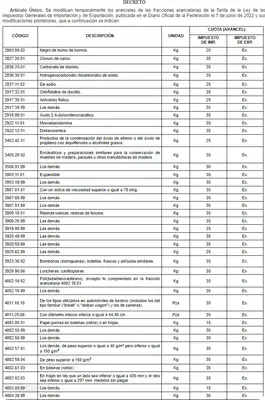- Shanghai Zhongshen International Trade Co., Ltd. - Two decades of trade agency expertise.
- Service Hotline: 139 1787 2118
Mexican President Andrés Manuel López Obrador recently signed a decree under which Mexico will impose temporary import tariffs of 5% to 50% on 544 imported goods. This tariff policy covers many important industries such as steel, aluminum, textiles, clothing, footwear, wood, plastics and their manufactured products, aiming to protect domestic industries and adjust the trade structure. This decree has been in effect since April 23, 2024 and is valid for two years.
Tariff details

Involved categories and tax rates:
(1) Steel:Round steel with a diameter less than 14 mm will be subject to a tariff of up to 50%.
(2) Aluminum:Specific types of aluminum products will face tariffs of 20% to 30%.
(3) Textiles, clothing, footwear:A unified temporary import tariff of 35% will be levied.
(4) Wood and its products:Depending on the type, the tariff varies between 15% and 25%.
(5) Plastics and their manufactured products:Depending on the specific product type, the tariff ranges from 5% to 20%.
(6) Chemical products, paper, cardboard:The tariffs for these product categories are all 10% to 15%.
(7) Ceramics, glass, electrical materials, transportation materials, musical instruments, furniture:The tariff rate has been increased from 15% to a maximum of 50%.
Special terms
Special preferences of trade agreements:
For countries and regions that have signed trade agreements with Mexico, such as the United States, Canada, and the European Union, they will enjoy preferential tariff treatment according to their respective agreements. This means that exporters from these regions may face lower tariff rates or tax - free policies.
The temporary nature of tariffs:
All newly established tariffs are temporary measures aimed at addressing the sharp external pressure on the domestic market and protecting the development of sensitive industries. The government will evaluate whether to extend the tariff policy based on market reactions and domestic and international economic situations.
Background and purpose
This tariff adjustment is not the first time Mexico has taken such measures. In fact, since 2023, Mexico has adjusted its tariff policies for many industries, especially for countries that have not signed free trade agreements, such as China. Mexican Economy Minister Raquel Buenrostro pointed out at a meeting in Mexico City that these measures aim to maintain the competitiveness of the most sensitive industrial sectors and prevent low - priced products from impacting the domestic market.,
In addition, the United States recently announced new restrictive measures against Chinese steel and aluminum products, and plans to triple the 301 tariffs on steel and aluminum products to the existing level, indicating that North America has adopted a more stringent attitude towards imports from Asia, especially China.
Impact and outlook
As Mexico has become the largest source of imports for the United States and has significantly risen in the global product exporter rankings, the Mexican government is trying to further consolidate the stability and development of the domestic market through these tariff measures. For Chinese enterprises that are laying out the Mexican market, this series of tariff adjustments undoubtedly increases market uncertainty. Enterprises need to closely monitor changes in trade policies in Mexico and North America and flexibly adjust their export strategies to cope with the new trade environment.foreign tradeFor enterprises, this series of tariff adjustments undoubtedly increases market uncertainty. Enterprises need to closely monitor changes in trade policies in Mexico and North America, and flexibly adjust their export strategies to cope with the new trade environment.
Related Recommendations
? 2025. All Rights Reserved. 滬ICP備2023007705號-2  PSB Record: Shanghai No.31011502009912
PSB Record: Shanghai No.31011502009912









